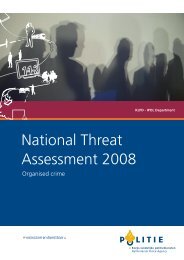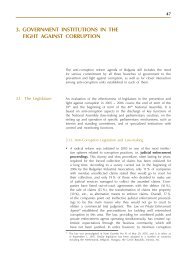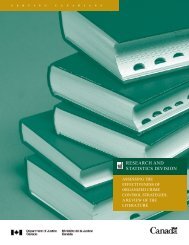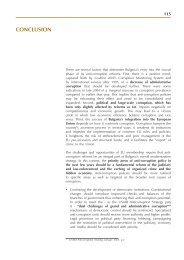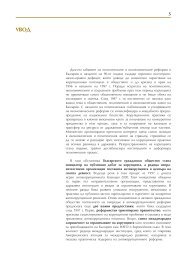5. Civil Society against Corruption (PDF, 293 kb)
5. Civil Society against Corruption (PDF, 293 kb)
5. Civil Society against Corruption (PDF, 293 kb)
You also want an ePaper? Increase the reach of your titles
YUMPU automatically turns print PDFs into web optimized ePapers that Google loves.
110 ANTI-CORRUPTION REFORMS IN BULGARIA<br />
In the late 1990s, corruption was typically discussed by the media<br />
in general and non-personified terms. Now, increasingly corruption<br />
coverage deals with specific cases. Print media, which tended to resort<br />
to sensationalism, are gradually adopting a much more professional<br />
attitude in the investigation of this issue. Already there are reporters who<br />
write unbiased pieces on both concrete cases of corruption and on the<br />
underlying causes of corruption.<br />
CHART 32. DEGREE OF CONCRETENESS OF CORRUPTION-RELATED ITEMS IN<br />
THE MEDIA (AUGUST 2004)<br />
632<br />
<strong>Corruption</strong> as a phenomenon in most general terms<br />
<strong>Corruption</strong> in a particular public sphere<br />
<strong>Corruption</strong> in a particular state authority, public organization, professional group<br />
Specific data on corruption<br />
Specific case of corruption<br />
Source: Media Monitoring by Coalition 2000<br />
103<br />
25<br />
131<br />
246<br />
One notable development has<br />
been the shift of focus from<br />
petty to high-level corruption<br />
without this being used<br />
for party political confrontation<br />
(Table 18). If soon after 1997<br />
the topic of corruption was<br />
usually brought up in the context<br />
of political antagonism, in<br />
recent years the public debate<br />
on corruption has shifted away<br />
from partisanship and more towards<br />
a broader civic agenda.<br />
The subject of anti-corruption<br />
is increasingly treated in the<br />
context of the need to establish<br />
a political culture of transparency<br />
and accountability. The<br />
perfunctory partisan discourse<br />
is gradually being replaced by<br />
an understanding of the underlying<br />
causes of corruption.<br />
Further, there has been a relative increase in the number of success stories<br />
on anti-corruption measures and a considerable increase in the average<br />
number of items reporting successful punishment of corruption.<br />
Political corruption has increasingly been spotlighted by the media and<br />
journalistic interest in it has been sustained by disclosures of corrupt<br />
abuse of power, but also by the overall process of adoption of modern<br />
standards of transparency in the context of the country’s European<br />
integration.<br />
Undoubtedly, the media rely on civic organizations and initiatives for<br />
assessments of the scope of corruption, as well as for information on<br />
the related perceptions and attitudes of Bulgarians. The level of trust<br />
achieved between the media and non-governmental organizations in the<br />
context of anti-corruption critique of governments is an important step<br />
toward reinforcing civil society.



